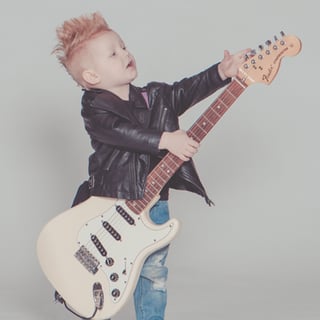
It’s still a new year filled with new promise and endless possibilities, and I hope that everyone finds ways to make music a part of their everyday lives. Whether it’s progressing on your instrument, creating original music, finding others to play with, or introducing music to a young person. If you’re like me, music is a joy and a gift. This leads me to a question that I get asked a lot, "What instrument should my younger child start with?" For such a simple question, the answer isn’t clean cut.
PIANO AS A FIRST INSTRUMENT
Before I get too in-depth with this question, I’m going to cut right to the chase and give my “knee-jerk” reply. Obviously, as a guitar teacher, my answer is… the piano. Wait, what??! Yeah, you read the right. I said the piano. Piano is a much easier way to make music for youngsters as opposed to the guitar. To play any given pitch on the piano, all it takes is one tiny little finger to press down on a certain piano key. The guitar is much more physical. For one thing, fretting a note can be, and usually is, a bit uncomfortable for almost all beginners at any age. Pair that with also having to accurately pluck the correct string simultaneously and you can see how, physically speaking, the piano wins over the guitar.
Beyond the physical part of playing, the piano is also laid out in a much more logical way than any other instrument. The keys go up in pitch incrementally as you go from far left to far right and there is only one specific key for each pitch. Pitches on the guitar can move both vertically and horizontally and there can be multiple places to play the exact same pitch. Along with that, music theory can be visualized much easier on the piano. As much as I love the guitar, I have to concede that the piano, for most young beginners, is the superior instrument. But…
LET THE CHILD PICK THEIR FIRST INSTRUMENT
Now I’m going to amend that answer. Truly, the best instrument to start a child on is the one they are most interested in. If your child is begging to learn to play a specific instrument, then that is where you should start. Can you imagine the huge letdown a kid would feel if she was begging to learn to play the drums and instead was forced to take piano lessons? I have two young sons and if either of them ever came to me and expressed a desire to learn any instrument, I would jump on it. Even if it were the most horrendous sounding instrument in the entire world (the bagpipes), I’d suffer through it and be ultra-supportive.
ADDITIONAL CONSIDERATIONS WHEN CHOOSING A FIRST INSTRUMENT: PRICE AND MOBILITY
So, there are my two big answers: the piano or the instrument that they are most interested in. Along with those answers come some considerations. For most people, the number one obstacle is price. You can get a quality student-sized acoustic guitar for WAY less than a piano, quality drum set, or virtually ANY wind instrument (trumpet, clarinet, flute, etc). The guitar and its smaller cute cousin, the ukulele, are also much more portable than a piano or full drum set. Wind and orchestra instruments, such as violins and cellos, can be beautiful sounding on their own, but are typically played in small to large groups. The guitar can be very much an “all-in-one” instrument that covers accompaniment, melodies, and complete arrangements. The only other instrument that can do that is a piano. But, again, price and mobility give an edge to the guitar. And I’ll throw out one more plus for the guitar: with my method for young beginners, most of my young students are playing along with “real” pop songs in the first month using easy-to-learn chord blocks. It would take a much longer time for the average young piano student to be able to read notation well enough to play chord changes fast enough to keep up with even the most basic pop song.
CONSIDER THE CHILD'S AGE
Another thing to consider is age. Some instruments are very difficult for young children. For example, a full-sized guitar on a 5-year old child, though it looks adorable, is a huge mistake. The child will not be able to play it with correct form. And not all teachers are good with young students. My advice is to do a consult with a teacher or two to find out their background with very young beginners and have an honest conversation about what can be expected.
Keep in mind, I’m not pushing any one instrument over another. Experience on any music instrument is going to be rewarding and worth the investment for all young people. I started on the piano and I very much believe that without that brief experience (one year), I wouldn’t be who I am now. Along with that, eight years on the trombone and playing with the school band also was a huge part of my musical growth. So there really is no absolute clear-cut answer.
